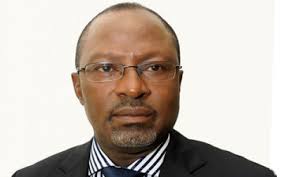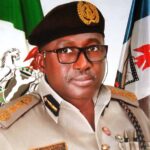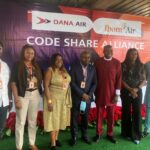
Managing Director of the Nigerian Airspace Management Agency, Captain Fola Akinkuotu said the agency has total radar surveillance that can identify aircraft or helicopter anywhere in Nigeria and it is collaborating with the military to secure the country airspace.
I want you to give me details; I know that you have been doing a lot in the area of communication?
Well, if you are looking at voice communication, it can be broken into three parts. We have ground to ground and ground to tower which are very good. We have approach, which is very good. But the challenge is the upper airspace, which we are working hard on. Maybe in the past we did not keep pace with the growing demand to continue to upgrade our equipment. So we didn’t try to cope with the increase and the demand in the upper air space. The VSAT (Very Small Aperture Terminal) system was a system that was donated to Nigeria may years ago. And I guess we just didn’t keep up with the times. Yes, and we didn’t think about the fact that things depreciate. Things need to be replaced, traffic grows, that is why we started having problems with our VSAT. This is because the extended range VHF rides on the back of the VSAT system for reliable and extended coverage.
So what percentage would you give the communication coverage of the airspace? Would you give it up to 75 per cent?
I will give it more than 75 per cent and as we drive closer to the conclusion of the AIS project on whose back our extended VHF range communication is going to ride, by that time, we expect to have a 100 per cent in both quality, clarity and range.
We would have completed the project, but for the COVID-19 pandemic induced disruptions. We had expected that it was supposed to have been concluded last year, but COVID-19 has slowed it down, not only because of money; money yes, but also because people could not travel.
The expatriates that needed to come to Nigeria and do it could not come. But we are getting closer. So, definitely we are well over 75 percent on completion and we expect that before the end of the year, it should be 100 percent completed. In the areas that I have told you, which are ground to ground, tower communication, approach communications, we are 100 percent covered.
The challenge is with the upper airspace communication; as upper airspace communications rides on VSAT which is being fixed. That was our Achilles heel but is being fixed.
Before you came spares for the Total Radar Coverage of Nigeria (TRACON) were not being replaced or replenished until you came in and did one or two things. I want to know this situation now?
Well, the situation now has improved considerably, definitely far from where we were in 2017. When I came in 2017, we had virtually severed the relationship with Thales, the company that built it and being the original manufacturers of equipment, the maintenance contract was allowed to elapse and NAMA did not re-engaged them. But when I came we re-engaged them. So we are able to get spares and they were interested in actually working with us. We have gotten to the point where we are able to get spares. Recently we had a situation in Kano, they sent the experts here and they also sent the spares real quick. So our relationship has improved and right now we have the reconditioning contract in place and we are also going to have the upgrade contract in place; so, it is looking good and much better than in the past.
When TRACON was completed the controllers complained that there were certain things that were not installed. Have they been installed now?
They are being addressed.
What projects do you urgently need funds to complete? You spoke about Aeronautic Information Service (AIS), which needs funding, what of Instrument Landing System (ILS) in some airports?
I will not say we are deficient in Instrument Landing System, but we are modernising. Being electronic hardware, there are age limitations and depreciation on these equipment and new technologies are coming up every day. So because of that you continue to have to replace them and since I have been here we have done a lot of replacements. And we are still in the process of replacing more.
As of now, I don’t believe we are deficient in ILS. We are not deficient in ILS systems. Do we need to replace? Yes, of course. This is technology and it keeps changing; we need to continue to bring in modern technology. Don’t forget that in years past a category I ILS was highly admired. You would be commended if you had that. But now everybody is looking out for CAT 3. And virtually all our ILSs in Nigeria are a minimum of CAT 2.
We have also introduced e-clearance platform. We have trial version of the app for e-flight plan, which can capture the passengers onboard and you can pay on the platform. Right now the e-flight plan on the NAMA platform is on trial. We are working to have the app on smart phones, tablets and computers.
Is there any time you can make it compulsory for airlines to put some certain corresponding equipment in their aircraft, so that they would dovetail with the modern equipment and facilities you are building?
That is a question for the NCAA (Nigerian Civil Aviation Authority). We are service providers; we are not regulators. This means that NAMA cannot make laws, the only thing is that we will continue to put in newer equipment such that the stakeholders, the airlines and all our clients benefit from it. When we install ILS category 3, the lightning system, and the power system are there. We expect the airlines, to take advantage of these things. For example, we put the Controller Pilot Data Link Communications (CPDLC) because it reduces voice communication and it puts data communication in place between the cockpit and the tower. So what that does is number one, it takes away any errors in understanding in language communications. It reduces the amount of talk time in the air. So, it enhances safety indirectly. When we can put these things in place; the regulator will decide the equipment that must be carried onboard an aircraft if they want to benefit from it.

The issue is that when you put out this equipment, they will be underutilized if domestic airlines do not have the corresponding equipment to benefit from it, it will only be foreign airlines that will take advantage of it few times in a day?
Number one is, if you look at the non-scheduled area, the executive airplanes have a lot of capabilities, so they benefit from it. The domestic airlines are gradually getting there. I am not saying the regulators cannot make laws to that effect, but the airlines gradually within the limits of their economic buying power are modernizing. You recall that many years back, I think before 2004, a lot the Boeing 737s that operated did not have flight management system. But today, virtually all of them have flight management systems. I believe that the airlines, the entrepreneurs, and the operators want to take advantage of the new technologies, because it reduces operational cost in terms of fuel saving which is significant. So, if you can do a PBN (Performance Based Navigation) approach, it might mean that you will be able to get into places that you may not ordinarily have access to. If you have capability to do a CAT 3 approach and the weather is not that good, you can still get in. So I believe that the operators will gradually take advantage of the new equipment that the Aviation agencies are putting in place.
How have you been training the technical personnel in the agency? Before you came in, there was subsisting animosity between the controllers and the engineers. Has that been tamed?
Well, it is not my life style for me to sing my own praises. I think if you go to the field and you ask, we have increased training across the board. Engineers are just as important as air traffic controllers because the equipment that the airplanes are going to use need to be top notch and need to be well serviced. Don’t also forget that the air traffic controllers want this equipment to work because it lessens their own burden if these things are working optimally. So we have synergy in the system. We are all getting training, even my account and audit staff get training. So all of us get some training. We have been training engineers at the same pace as air traffic controllers.
In terms of security, there have been unconfirmed reports of aircraft coming into the country unnoticed and allegedly bringing in weapons. We used to hear that if any aircraft enters the Nigerian airspace it will be tracked down by TRACON, can NAMA still capture any aircraft that enters Nigeria’s airspace?
I will say yes. We have surveillance capability to detect aircraft that have primary, secondary or both transponders that transverse our airspace. Enforcement belongs to the military and today we have improved cooperation between the civil and the military. I do believe that there is a significant enhancement in civil/ military relationship and it is going to get better. Don’t forget that we all need security. We all want to be safe.
If there is airfield lighting in all the airports and airlines operates late into the nights into most of those airports, will it be of any benefit to NAMA?
Of course yes. You cannot have night flight without airfield lighting. Now, NAMAs revenue is based on how many flights operate. So the more airlines operate, the more revenue NAMA earns. It is in our interest to have 24/7 operations and such operations will not be possible without airfield lighting.
However, we are not here just because of revenue alone; we are also here because of safety. It is good for us to have airfield lighting everywhere, such that we can enhance safety of flight operations, both day (during adverse weather) and at night.
Last year, the agency, went to the National Assembly. They wanted some of those laws to be amended, what would be the benefit to NAMA if the laws are amended? And how is the collaboration, among the agencies, especially you and the Nigerian Meteorological Agencies (NIMET) and the Federal Airports Authority of Nigeria (FAAN)?
First of all we all have our Acts that stipulate what our mandates are but then we all have to collaborate to enhance air safety. To that extent we work together, we meet together, discuss and exchange ideas under the Honourable Minister’s leadership. The Honourable Minister regularly invite us to brainstorm. Earlier this year, there was a Ministerial retreat for all the agencies. All the agencies including their CEOs were represented at Uyo. So, there is synergy and we recognize that. For example, NAMA needs NIMET as we have to relay weather information to aircraft. Weather information is critical to safety. The pilot will depend on weather information either from ATC or from the ATIS on weather situations. So NAMA cannot say that they would do without NIMET. Neither can we say we will do without FAAN or even the regulator. We all work together.
COVID-19 eroded your revenue and agencies were gasping, especially NAMA that most of its income come from international operations. Do you think you have gone back to pre-COVID period or are you moving towards pre-COVID period in your revenue?
There is no way we are anywhere near pre-COVID era. At the peak of the COVID-19 period we went down to about 10 percent of our revenue. Not just by 10 per cent, we went to actual 10 per cent. As we speak, we are at about 47 percent. So there is no way we are anywhere near pre-COVID period.

But you have been able to sustain the welfare of your staff?
Well, we try to do our best because the fact is that without man, nothing really falls into place. You can have the most technologically advanced systems, you still need man to be able to utilise and deploy properly. So man is at the core of any human endeavour. So, we don’t play with the human person here. And secondly, the mandate is that salaries of our staff belong to the first charge. Being first charge, we do everything possible to make sure that our staff are paid regularly and promptly so that they can do their jobs. NAMA provides essential and critical services for the safety of aviation. So we will rather not joke with a situation that impact negatively on safety.
THISDAY






